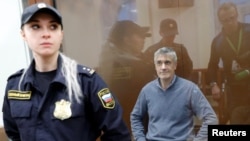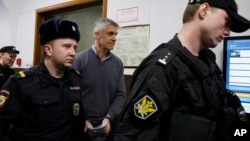A Russian court has ordered Michael Calvey, the founder of Moscow-based private equity firm Baring Vostok Capital Partners and one of the country's most prominent American investors, to be held in custody for nearly two months on charges of embezzlement.
Moscow Basmanny court judge Artur Karpov ordered Calvey held in custody until at least April 13, arguing that the seriousness of the criminal charges made him a flight risk.
Calvey's attorney said the investor maintained his innocence and would appeal. Four other defendants in the case have been ordered to remain in pretrial custody for two months.
A spokeswoman for the Moscow district court Friday announced that Calvey had been detained along with other members of the firm Thursday on suspicion of stealing $37.5 million (2.5 billion rubles), a charge that carries a sentence of up to 10 years in prison upon conviction.
Private equity group partner
Calvey, 51, is a senior partner who founded Baring Vostok in 1994. According to the firm’s website, the private equity group holds more than $3.5 billion in committed capital and is a controlling shareholder in Russia’s Vostochny Bank, which focuses on Siberian and Far Eastern markets.
A statement on the Baring Vostok website said the company “believes that the detention of its employees and the charges that have been brought are a result of a conflict with shareholders of Vostochniy [sic] Bank. We have full confidence in the legality of our employees’ actions and will vigorously defend their rights. Baring Vostok’s activities in the Russian Federation are fully compliant with all applicable laws.”
Before launching Baring Vostok, Calvey worked for the European Bank for Reconstruction and Development and for Salomon Brothers. Since arriving in Moscow in the mid-1990s, he’s become a prominent and highly visible member of the Moscow investment community. He is a board member of the Washington-based Atlantic Council.
Pleas from investment community
The announcement of Calvey’s detention sent shockwaves through the international investment community, prompting numerous pleas for his immediate release.
Herman Gref, head of Sberbank, Russia’s biggest state bank, issued a statement calling Calvey a “decent, honest man,” while Kirill Dmitriev, the head of Russia’s $10 billion sovereign wealth fund and a close contact of Russian President Vladimir Putin, described Calvey as “committed to the highest ethical standards accepted in the investment community.”
Kremlin officials Friday said Putin wasn’t aware of the charges being brought against Calvey.
“We are aware that a U.S. citizen was arrested on February 14, 2019, in Russia," a State Department spokesperson said Friday. “We have no higher priority than the protection of U.S. citizens abroad. Due to privacy considerations, we do not have any additional information at this time.”
Calvey is the third Westerner to face prosecution in Russia since Dec. 31, when American citizen Paul Whelan, a former Marine, was jailed on accusations of spying. Last week, a Russian court sentenced Dennis Christensen, a Danish adherent of the Jehovah’s Witnesses religion, to six years in prison for “organizing the activity of an extremist organization.”
Although Russia has jailed foreign investors who were vocal opponents of the Kremlin, Calvey has no such record of public political opinions.
Russia is “a do-it-yourself market,” Calvey told The Washington Post in 2011. “You can’t rely on outside service providers.”
In that interview, Calvey said his group operates with 20 investors, four full-time lawyers and three government relations managers, along with a host of accountants and administrative support. At that time, all 10 of his partners were Russian nationals.
“International firms aren’t equipped for Russia,” he told the Post. “And they usually have a low tolerance threshold for uncertainty and no sense of humor for Russian surprises,” which he described as surprise audits, seizure of assets for back taxes, and sudden, sometimes seemingly arbitrary business license reviews.
‘The final straw’
Vocal Kremlin critic and Hermitage Capital co-founder Bill Browder was denied entry into Russia in 2005 after his lawyer, Sergei Magnitsky, began investigating governmental misconduct and corruption in response to suspicious tax evasion charges brought against Hermitage by Russia’s Interior Ministry.
Magnitsky died under suspicious circumstances in Russian custody in 2009.
“The arrest of Mike Calvey in Moscow should be the final straw that Russia is an entirely corrupt and [uninvestable] country,” Browder said in a tweet Friday. “Of all the people I knew in Moscow, Mike played by their rules, kept his head down and never criticized the government.”
Pete Cobus is VOA’s acting Moscow correspondent. State Department correspondent Nike Ching contributed reporting from Washington. Some information is from Reuters.





